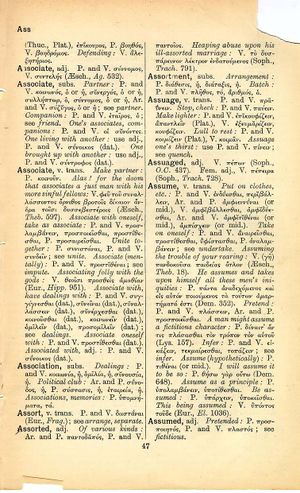associate: Difference between revisions
ψυχῆς πείρατα ἰὼν οὐκ ἂν ἐξεύροιο πᾶσαν ἐπιπορευόμενος ὁδόν· οὕτω βαθὺν λόγον ἔχει → one would never discover the limits of soul, should one traverse every road—so deep a measure does it possess
mNo edit summary |
m (Woodhouse1 replacement) |
||
| Line 1: | Line 1: | ||
{{Woodhouse1 | {{Woodhouse1 | ||
|Text=[[File:woodhouse_47.jpg|thumb|link={{filepath:woodhouse_47.jpg}}]] | |Text=[[File:woodhouse_47.jpg|thumb|link={{filepath:woodhouse_47.jpg}}]] | ||
===adjective=== | |||
P. and V. [[σύννομος]], V. [[συντελής]] (Aesch., '' | [[prose|P.]] and [[verse|V.]] [[σύννομος]], [[verse|V.]] [[συντελής]] ([[Aeschylus|Aesch.]], ''[[Agamemnon]]'' 532). | ||
===substantive=== | |||
[[partner]]: P. and V. [[κοινωνός]], ὁ or ἡ, [[συνεργός]], ὁ or ἡ, [[συλλήπτωρ]], ὁ, [[σύννομος]], ὁ or ἡ, Ar. and V. [[σύζυγος]], ὁ or ἡ; see [[partner]]. | [[partner]]: [[prose|P.]] and [[verse|V.]] [[κοινωνός]], ὁ or ἡ, [[συνεργός]], ὁ or ἡ, [[συλλήπτωρ]], ὁ, [[σύννομος]], ὁ or ἡ, [[Aristophanes|Ar.]] and [[verse|V.]] [[σύζυγος]], ὁ or ἡ; see [[partner]]. | ||
[[companion]]: P. and V. [[ἑταῖρος]], ὁ; see [[friend]]. | [[companion]]: [[prose|P.]] and [[verse|V.]] [[ἑταῖρος]], ὁ; see [[friend]]. | ||
[[one's associates]], [[companions]]: [[prose|P.]] and [[verse|V.]] [[οἱ συνόντες]]. | |||
[[one living with another]]: use adj., [[prose|P.]] and [[verse|V.]] [[σύνοικος]] (dat.). | |||
[[one brought up with another]]: use adj., [[prose|P.]] and [[verse|V.]] [[σύντροφος]] (dat.). | |||
===verb transitive=== | |||
[[make partner]]: [[prose|P.]] [[κοινοῦν]]. | |||
[[alas! for the doom that associates a just man with his more sinful fellows]]: [[verse|V.]] [[φεῦ τοῦ συναλλάσσοντος ὄρνιθος βροτοῖς δίκαιον ἄνδρα τοῖσι δυσσεβεστέροις]] ([[Aeschylus|Aesch.]], ''[[Seven Against Thebes]]'' 597). | |||
[[associate with oneself]], [[take as associate]]: [[prose|P.]] and [[verse|V.]] [[προσλαμβάνειν]], [[προσποιεῖσθαι]], [[προστίθεσθαι]], [[prose|P.]] [[προσαιρεῖσθαι]]. | |||
[[unite together]]: [[prose|P.]] [[συνιστάναι]], [[prose|P.]] and [[verse|V.]] [[συνδεῖν]]; see [[unite]]. | |||
[[associate]] ([[mentally]]): [[prose|P.]] and [[verse|V.]] [[προστιθέναι]]; see [[impute]]. | |||
[[associating folly with the gods]]: [[verse|V.]] [[θεοῖσι προσθεὶς ἀμαθίαν]] ([[Euripides|Eur.]], ''[[Hippolytus]]'' 951). | |||
[[associate with]], [[have dealings with]]: [[prose|P.]] and [[verse|V.]] [[συγγίγνεσθαι]] (dat.), [[συνεῖναι]] (dat.), [[συναλλάσσειν]] (dat.), [[συνέρχεσθαι]] (dat.), [[κοινοῦσθαι]] (dat.), [[κοινωνεῖν]] (dat.), [[ὁμιλεῖν]] (dat.), [[προσομιλεῖν]] (dat.); see [[dealings]]. | |||
[[associate oneself with]]: [[prose|P.]] and [[verse|V.]] [[προστίθεσθαι]] (dat.). | |||
[[associated with]], adj.: [[prose|P.]] and [[verse|V.]] [[σύνοικος]] (dat.). | |||
}} | }} | ||
Revision as of 08:49, 20 May 2020
English > Greek (Woodhouse)
adjective
P. and V. σύννομος, V. συντελής (Aesch., Agamemnon 532).
substantive
partner: P. and V. κοινωνός, ὁ or ἡ, συνεργός, ὁ or ἡ, συλλήπτωρ, ὁ, σύννομος, ὁ or ἡ, Ar. and V. σύζυγος, ὁ or ἡ; see partner.
companion: P. and V. ἑταῖρος, ὁ; see friend.
one's associates, companions: P. and V. οἱ συνόντες.
one living with another: use adj., P. and V. σύνοικος (dat.).
one brought up with another: use adj., P. and V. σύντροφος (dat.).
verb transitive
alas! for the doom that associates a just man with his more sinful fellows: V. φεῦ τοῦ συναλλάσσοντος ὄρνιθος βροτοῖς δίκαιον ἄνδρα τοῖσι δυσσεβεστέροις (Aesch., Seven Against Thebes 597).
associate with oneself, take as associate: P. and V. προσλαμβάνειν, προσποιεῖσθαι, προστίθεσθαι, P. προσαιρεῖσθαι.
unite together: P. συνιστάναι, P. and V. συνδεῖν; see unite.
associate (mentally): P. and V. προστιθέναι; see impute.
associating folly with the gods: V. θεοῖσι προσθεὶς ἀμαθίαν (Eur., Hippolytus 951).
associate with, have dealings with: P. and V. συγγίγνεσθαι (dat.), συνεῖναι (dat.), συναλλάσσειν (dat.), συνέρχεσθαι (dat.), κοινοῦσθαι (dat.), κοινωνεῖν (dat.), ὁμιλεῖν (dat.), προσομιλεῖν (dat.); see dealings.
associate oneself with: P. and V. προστίθεσθαι (dat.).
associated with, adj.: P. and V. σύνοικος (dat.).

